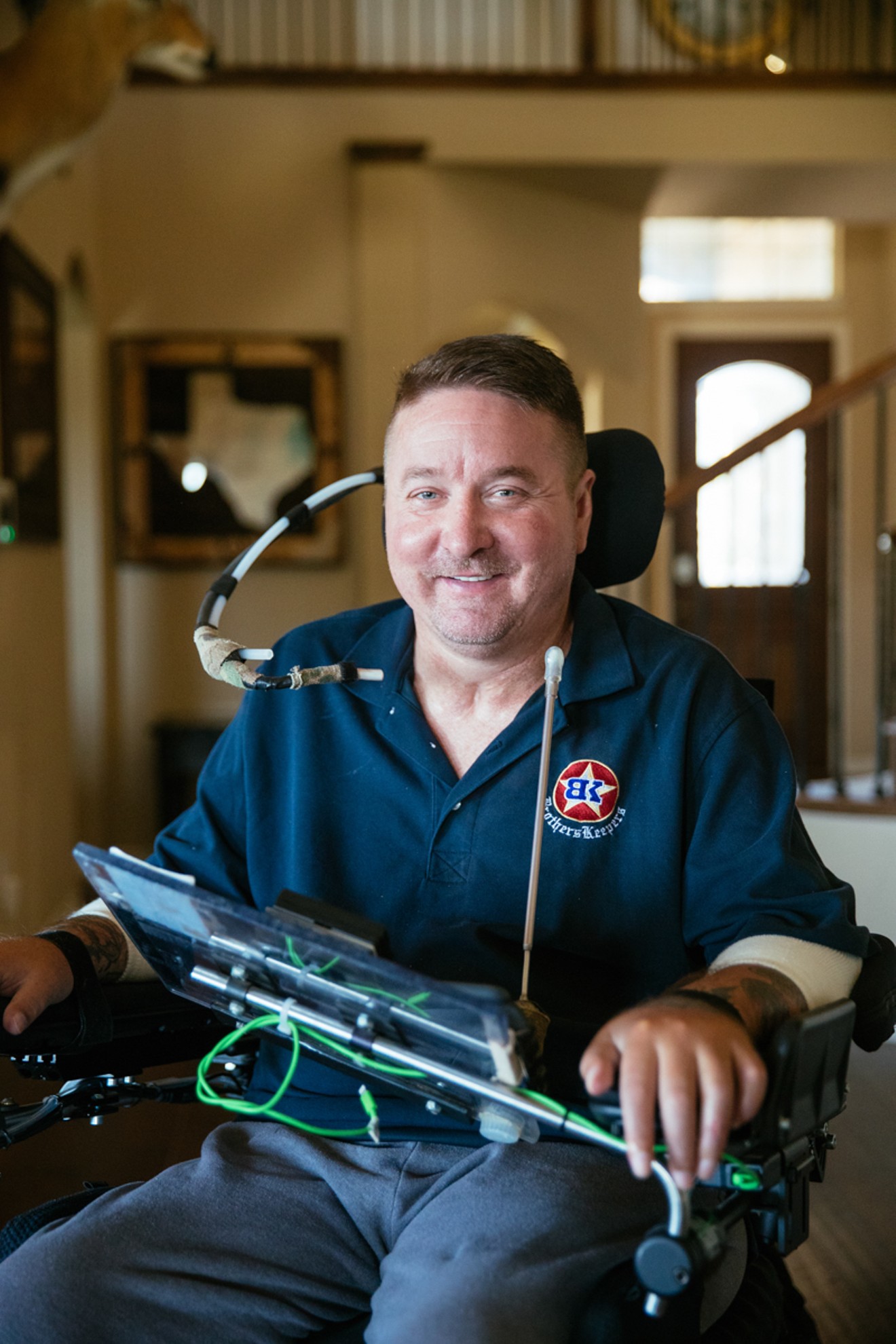Under fully deployed canopies, a 24-man selection team for the U.S. Air Force's 24th Special Tactics Squadron gathered its bearings on a nighttime training mission. The high-altitude jump required the men to descend from the skies in formation onto a blacked-out landing zone. But while drifting over White Sands, New Mexico, Tech Sgt. Jack Fanning’s night-vision goggles came loose from his helmet.
Left blind with his goggles dangling below his chin, Fanning says he stayed calm.
“When you do that kind of jump, you’re under canopy for 45 minutes or so flying to the target area," he says. "It’s a pretty sketchy, pretty difficult infiltration, but you know I had plenty of jumps before, so everything I thought was going OK.”
In the process of that training exercise, he misjudged his distance from the ground. Thinking he was hundreds of feet higher than he was, Fanning moved to detach his rucksack and collided with the earth at more than 30 miles per hour. The force of the landing paralyzed him instantly, but he remained conscious for the duration.
“I didn’t check in, and I could hear [the team] chatting on the radio looking for me 'cause they knew something was wrong,” Fanning says. “But I was paralyzed, could barely breathe, my right lung was collapsed, my chin strap was choking me out, and so I was lying there for about 15 minutes, 20 minutes, and I knew I was about to die, but I was fighting like heck.”
By chance, the infrared strobe on Fanning’s helmet was turned on after the crash. His teammates quickly found him and, in yet another stroke of what Fanning sees as divine intervention, a neurosurgeon was on site when he arrived at William Beaumont Army Medical Center. He survived, but in an instant, his 13-year career in the Air Force had ended.
It began with his father, an Air Force veteran. After giving up on college, Fanning moved back home to Fort Worth. He worked as a glazier, installing windows on skyscrapers. His co-workers called him “Jackrabbit,” both for his fearlessness and boundless energy. People like that don’t usually stay home for long.
“I just got tired of being in a rut and having a regular job, so I was pretty bored, and I talked to my dad about joining the service, and he was like, ‘Yeah, man, go for it,’” Fanning says.
In 1997, he started basic training. He says he didn’t realize the Air Force had special operation forces until a “burly chested dude” played a tape for him. This was his first exposure to the Combat Control Team, an elite special operations force that acts as both battlefield operators and air traffic controllers.
“You’re riding bikes, you’re jumping out of planes, you’re scuba diving, you’re shooting, you’re calling in close air support,” Fanning says. “It was amazing, man. I wish I had done it right out of high school, but I don’t know if I would’ve had the mental fortitude at that point.”
His fortitude was put to the test after 9/11. He'd served as a combat controller for three years and was sent on six deployments from 2001-05, to both Iraq and Afghanistan. After the first few deployments, Fanning says, he started getting good at it. He absorbed knowledge from each of the teams he was assigned to, and by his last deployment, he was singled out to become an instructor at the Pope Air Force Base.“It was amazing, man. I wish I had done it right out of high school, but I don’t know if I would’ve had the mental fortitude at that point.” – Jack Fanning
tweet this
“I enjoyed being over there and fighting the terrorists and protecting the homeland, you know,” he says. “There were some great times and there were some horrible times, but somebody has to do it, and I was proud to be able to serve my country.”
At the time of Fanning’s injury, he was training to join the Air Force’s tier one unit, which operates with Navy SEAL Team 6.
“I think I got put in this chair for a reason, and fast forward to today, that reason is to help other veterans,” Fanning says. “You see a lot of paralyzed guys that can use their arms. I can’t. So thank God there’s a lot of technology out there where I can use my mouth.”
Fanning requires full-time caretaking, but his wheelchair’s sip-and-puff mechanism can propel him. He also uses his mouth and homemade styluses for his phone and iPad in conjunction with a smart home provided by Vivint Smart Home. The company hosted a ceremony in Fanning’s honor at one of its conferences and put him in touch with the National Ability Center, a nonprofit group that offers adaptive programs and retreats.
The NAC brought Fanning on as a veteran to help with retreats. Fanning still has all the charisma and confidence of a special forces operator, and through a program with the NAC in March, Fanning was able to snow-ski in a sip-and-puff chair with his son Brock. These are priceless experiences, and Fanning is now in the business of facilitating these experiences for others.“I can do more things, which just empowers me. It trickles down — I want to empower and honor other people.” – Jack Fanning
tweet this
“The technology definitely frees me up and gives me more independence because I’m always having to have caregivers around me, and with the technology, I’m not as needy, if you will,” he says. “I can do more things, which just empowers me. It trickles down — I want to empower and honor other people.”
Fanning and a few of his longtime high school friends formed BrothersKeepers, a nonprofit organization that hosts retreats and events for wounded veterans. The group acts as a kind of therapy by community, bringing former military members and their families together for the sake of being together. In 2016, Fanning jumped from an airplane once more, and through BrothersKeepers, he is giving others the same chance to reclaim what they’ve lost.
“You can still live a quality life even though you’re stuck in a chair or you don’t have limbs or whatever the case is. It’s pretty neat,” Fanning says. “There’s a healing that takes place when you link up with a whole bunch of families that are going through the same struggles that you’re going through on a daily basis.
"You know, it’s tough if you get your legs blown off or you’re paralyzed or you got PTSD [post-traumatic stress disorder] real bad. You can go in a dark place and stay isolated and not want to deal with people, so I get them out there and say, ‘You can do all this fun stuff, and you can do it with your family.’”














